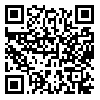Volume 37, Issue 146 (February- In Press 2024)
IJN 2024, 37(146): 0-0 |
Back to browse issues page
Download citation:
BibTeX | RIS | EndNote | Medlars | ProCite | Reference Manager | RefWorks
Send citation to:



BibTeX | RIS | EndNote | Medlars | ProCite | Reference Manager | RefWorks
Send citation to:
Moghimi S, Seraji M, Arab Borzu Z, Eghdam F, Rezaei S. The relationship between health literacy with knowledge, Attitude and practice in the prevention behaviors of covid-19- A Brief research. IJN 2024; 37 (146)
URL: http://ijn.iums.ac.ir/article-1-3733-en.html
URL: http://ijn.iums.ac.ir/article-1-3733-en.html
1- Health Education and Health Promotion, Student Research and technology Committee, Zahedan University of Medical Sciences, Zahedan, Iran
2- Health Education and Health Promotion, Health Promotion Research Center, Zahedan University of Medical Sciences, Zahedan, Iran. ,serajimaryam@gmail.com
3- Department of Epidemiology & Biostatistics, Zahedan University of Medical Sciences, Zahedan, Iran
4- Student Research and technology Committee, Zahedan University of Medical Sciences, Zahedan, Iran
5- Health Promotion Research Center, Zahedan University of Medical Sciences, Zahedan, Iran
2- Health Education and Health Promotion, Health Promotion Research Center, Zahedan University of Medical Sciences, Zahedan, Iran. ,
3- Department of Epidemiology & Biostatistics, Zahedan University of Medical Sciences, Zahedan, Iran
4- Student Research and technology Committee, Zahedan University of Medical Sciences, Zahedan, Iran
5- Health Promotion Research Center, Zahedan University of Medical Sciences, Zahedan, Iran
Abstract: (207 Views)
Background and purpose: When COVID-19 progressed, health literacy emerged as an important tool for its prevention. The need for health literacy is also important for attaining positive woman health outcomes. The aim was to investigate the relationship between health literacy and knowledge, attitude and Functional in water behaviors of covid-19 in women referring to comprehensive health service centers.
Methods: This descriptive cross-sectional study was conducted on 144 women who referred to comprehensive health service centers between September and December of 2022. The sampling method was multi-stage stratified based on the entry criteria (age between 18 and 60 years of women) into the study.. In order to collect data, the demographic profile form, the awareness, attitude and performance form and the Covid-19 health literacy form were used. Data were analyzed using Pearson correlation, independent t, one-sided and chi-square tests in SPSS version 23.
Findings: In the present study, the average age of the participants was 31.74±10.02, 64.4% of middle school women had education, 90.3% were married, and 29.9% had income between 6-10 million. Among the studied women, 81.9% were willing to receive the vaccine and 28.7% had history of hospitalization. In the present study, the amount of knowledge was 14.9±2.93, attitude was 42.9±6.69, performance was 32±6.1, and health literacy was 39.5±11.08. Demographic variables (age, education, marital status, income, receiving vaccines, history of hospitalization) showed 48% of the variance of health literacy, and the variable of receiving vaccines was significant (P<0.05), which means that acceptance Vaccination increased with age and education level. In stage 2, 61% of the variance of behavior was reported, in which changes in age, education level, vaccination and report, attitude and performance were significant. (P<0.05).
Conclusion: The results of the study showed that with the increase in health literacy, awareness, attitude and performance of women increased. In addition, health literacy increased with age and education level. The more awareness, the more health literacy increases. It is recommended to use intervention programs to increase health literacy for emerging diseases. In addition, policy makers can use the results of this research in health promotion interventions.
Methods: This descriptive cross-sectional study was conducted on 144 women who referred to comprehensive health service centers between September and December of 2022. The sampling method was multi-stage stratified based on the entry criteria (age between 18 and 60 years of women) into the study.. In order to collect data, the demographic profile form, the awareness, attitude and performance form and the Covid-19 health literacy form were used. Data were analyzed using Pearson correlation, independent t, one-sided and chi-square tests in SPSS version 23.
Findings: In the present study, the average age of the participants was 31.74±10.02, 64.4% of middle school women had education, 90.3% were married, and 29.9% had income between 6-10 million. Among the studied women, 81.9% were willing to receive the vaccine and 28.7% had history of hospitalization. In the present study, the amount of knowledge was 14.9±2.93, attitude was 42.9±6.69, performance was 32±6.1, and health literacy was 39.5±11.08. Demographic variables (age, education, marital status, income, receiving vaccines, history of hospitalization) showed 48% of the variance of health literacy, and the variable of receiving vaccines was significant (P<0.05), which means that acceptance Vaccination increased with age and education level. In stage 2, 61% of the variance of behavior was reported, in which changes in age, education level, vaccination and report, attitude and performance were significant. (P<0.05).
Conclusion: The results of the study showed that with the increase in health literacy, awareness, attitude and performance of women increased. In addition, health literacy increased with age and education level. The more awareness, the more health literacy increases. It is recommended to use intervention programs to increase health literacy for emerging diseases. In addition, policy makers can use the results of this research in health promotion interventions.
Type of Study: Research |
Subject:
nursing
Received: 2023/09/8 | Accepted: 2024/05/21 | Published: 2024/05/21
Received: 2023/09/8 | Accepted: 2024/05/21 | Published: 2024/05/21
Send email to the article author
| Rights and permissions | |
 |
This work is licensed under a Creative Commons Attribution-NonCommercial 4.0 International License. |





